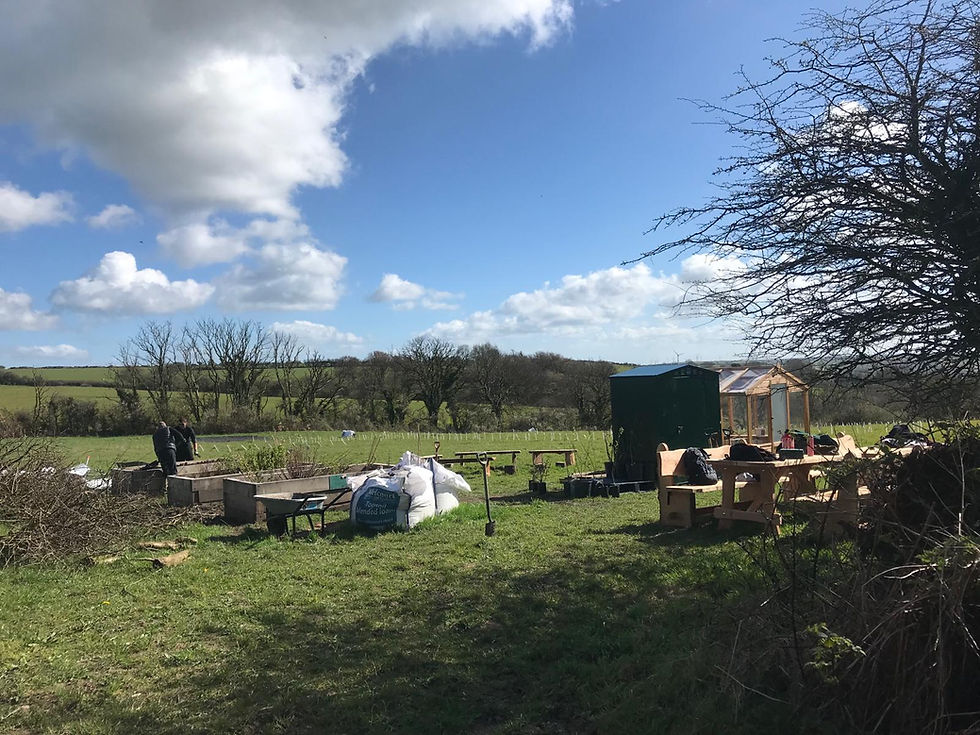Making LAB (Lactic Acid Bacteria) at Home
- heather5904
- May 15, 2024
- 3 min read
Updated: May 16, 2024
Microbes can work wonders for your plants and soil. One such microbe, Lactic Acid Bacteria (LAB), is easy to cultivate at home using simple ingredients: rice, milk, and water.
Here is the step-by-step process of making your own LAB.
Ingredients:
500 grams of white rice
2 litres of untreated milk (preferably organic)
2 liters of untreated water

Step 1: Capture the Microbes
Soak the Rice: Place the white rice in a container and cover it with 'good water'. Ensure the container has a breathable lid. Let it sit for about a day.
*Good water is untreated water such as rain or spring water. Water from the tap can include fluoride or other chemicals that may interfere with the microbial activity and overall effectiveness of the soil amendments. Using good water, such as untreated water like rain or spring water, ensures that the beneficial microbes in the soil amendments can thrive without any hindrance from potentially harmful substances.

Stage 2:
1. Strain Off the Rice: After a day, strain the rice from the water. Don't throw away the rice; it's still good for dinner!
2. Let it Ferment: Leave the rice water in the container for another couple of days, away from direct sunlight. You'll notice the water becoming cloudy and developing a sour smell.


Stage 3:
Add Milk: Once the rice water has fermented, add the untreated milk to it. Cover the container again with a breathable lid and place it in a warm spot, away from direct sunlight. The milk solids will start to separate, depending on the room temperature.
Stage 4: Remove Solids: As the milk solids separate, carefully remove them from the top of the mixture, leaving behind the creamy yellow liquid. You can use a syphon or carefully quarter the top to remove them.
Store Your LAB: After removing the solids, store the creamy yellow liquid in a glass bottle with a breathable lid. Keep it in the fridge, where it will stay good for up to two months.
Benefits:
Enhanced Soil Health: LAB increases the decomposition of organic matter, prevents rotting, and protects plants against pests and diseases.
Improved Soil Biology: It's beneficial for increasing soil biodiversity, which is essential for healthy plant growth.
Usage:
Dilution: Mix 1 millilitre of LAB (equivalent to two capfuls) with 1 litre of water (1:1000 ratio). Use the diluted solution within 24 hours.
Versatile Applications: LAB can be used to enhance compost or bokashi quality, such as soil soaks, foliage sprays, livestock drinks (diluted by 3%), greywater treatment, and even as a natural cleaning product.

This blog post was written by Peni Ediker, who has a thriving low-impact smallholding in West Wales. Peni is part of the Hwb Dyscir Tir project, which offers land-based skills. As part of this project, Peni is offering a series of soil-health workshops.
Workshops:
WHILE YOU ARE HERE,
CHECK OUT ALL OTHER WORKSHOPS COMING UP WITH HWB DYSGU'R TIR:
Taith Gerdded Amaeth-Goedwigaeth | Agroforestry Farm WalkThu 6 Jun at 10:00
How to make really good compost | Sut i wneud compost gwychThu 13 Jun at 10:00
The Weatherproof Farm with Niels CorfieldWed 19 Jun at 10:00
Llinyn Naturiol / Natural CordageSat 29 Jun at 10:00
BIO FERTILISERS & Garden Amendments | BIOWRTAITH a Gwelliannau i'r ArddThu 25 Jul at 10:00















Our Jaipur Call Girls Service is built on trust, quality, and privacy. We understand what clients look for, so we provide only the finest companions who can make you feel relaxed. From stunning high-profile models to sweet and friendly girls, we have options to suit every preference. Every booking is private, professional, and smooth. With our agency, you don’t have to worry about safety or fakes. Choosing our Jaipur Call Girls Service means enjoying Jaipur with true beauty and charm.
At first, I wasn’t sure about trying Escorts in Sainik Farm, but after my experience, I can say it was worth it. The girl was polite, beautiful, and made me feel very comfortable. We had an enjoyable time together, filled with fun and laughter. The agency kept things discreet, so I didn’t have to worry about anything. If you’re new to this, don’t hesitate—the experience is safe, professional, and far better than you can imagine.
This guide is incredibly straightforward and useful—it's fascinating how nature provides such effective tools, particularly for enhancing soil health! The procedure somewhat resembles overseeing a business project: collecting the appropriate resources, adhering to a systematic plan, and exercising patience as the outcomes unfold. For anyone juggling this type of practical work with academic commitments, particularly in fields like business, a little Business Management assignments help can surely help everything run seamlessly!